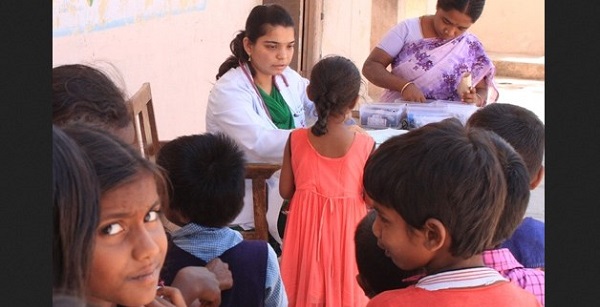School Health Services

From Current Affairs Notes for UPSC » Editorials & In-depths » This topic
IAS EXPRESS Vs UPSC Prelims 2024: 85+ questions reflected
Following the prolonged school closure in the wake of the pandemic, students have returned to schools for in-person classes. The recent times call for policy measures and actions to address the needs of the school-children. On the academic front, there have been discussions on topics like ‘learning recovery’. However, the children’s health needs aren’t getting as much attention.
Why are school health services important?
- Health-care needs are frequently equated with medical needs. This is one of the reasons why school healthcare services receive so little policy attention.
- Schoolchildren have a relatively low sickness rate and hence the requirement for medical care is limited. However, they have a wide-range of age-specific health needs, linked to:
- unhealthy dietary habits
- irregular sleep
- lack of physical activity
- mental health problems
- dental and eye problems
- sexual behaviour
- tobacco use
- substance abuse, etc.
- The health knowledge and the lifestyle acquired during the school years are known to stick in adulthood.
- These gains lay the foundation for life-long healthy behaviour.
- For instance, evidence shows that efforts to stop tobacco use are especially effective if started at the school-level.
How has these services evolved in India?
- India’s first record of school health services goes back to 1909, when presidency of Baroda started medical examination of school students.
- In 1946, the Sir Joseph Bhore committee made observations on the under-developed status of the Indian school health services.
- The Secondary Education Committee, in 1953, called for comprehensive policy interventions with regards to school health and feeding programs.
- Following this, few states undertook programmatic interventions that primarily focused on nutrition. However, the school health services part largely remained a ‘token’ service.
Has the pandemic changed things?
- In these 2.5 years of pandemic, there hasn’t been any serious initiatives towards school health.
Aam Aadmi School Clinics Project
- In March 2022, the Delhi government started 20 school health clinics and has promised more.
- These are being funded through Corporate Social Responsibility route and is also supported by collaboration between the government’s health and education departments.
- These clinics focus on providing curative services.
Learnings:
- This initiative, though small, shows a recognition of:
-
- Importance of school health services in post-pandemic period
- Importance of multi-stakeholder partnership in school health services
- School health services still aren’t comprehensive enough.
How can things be improved?
- The limited understanding of what constitutes an effective and well-functioning school health service is one of the main reasons for such programs being wrongly designed and rudimentary in most of the low and middle income nations.
FRESH Framework:
- FRESH or ‘Focusing Resources on Effective School Health’ is a framework given by UNICEF, WHO and the World Bank.
- It proposes 4 core areas of focus:
-
- School health policies
- Water, sanitation and the environment
- Skills-based health education
- School-based health and nutrition services
- It also gives supporting strategies:
-
- Effective partnerships between teachers and healthcare workers
- Effective partnership between education and health sectors
- Effective community partnerships
- Pupil awareness and participation
Other Guidelines:
- The US Centers for Disease Control and Prevention suggest that school health services focus on 4 main areas:
-
- Acute and emergency care
- Family engagement
- Chronic disease management
- Care coordination
- According to the WHO, such health services must be designed on the basis of local need assessment. It should include components of:
-
- Health promotion
- Health education
- Screening- followed by appropriate care, referral and support
- The services’ objectives should be:
-
- Promotion of positive health
- Prevention of diseases
- Early diagnosis
- Treatment and follow up
- Developing health consciousness among children
- A healthy school environment
- Over the last 30 years, many countries, especially the European ones, have successfully made use of these approaches under their HPS (Health-promoting Schools) initiative.
What is the way ahead?
- As schools reopen, there is an opportunity to adopt a proactive approach towards a strengthened and expanded school health services system.
- For this, certain steps need to be taken:
Review Status
- All the states need to review the status of their school health services.
- Then a roadmap needs to be drawn up for revamping and strengthening these services. The roadmap should have detailed timeline.
- Dedicated budgetary allocation is a must. The 15th Finance Commission’s health sector grant can be leveraged here.
Services
- Building upon the existing infrastructure, the renewed focus should be, not only on curative services, but also on preventive and promotive services. A functioning referral linkage is also vital.
- Teachers, medical experts and health experts should give health talks and organize lifestyle sessions.
- Teaching of subjects, like adolescent sexual health, menstrual hygiene, etc., must be integrated into regular classroom teaching.
Online Consultations
- School health clinics must be supplemented with online consultation service to address physical and mental health needs.
- Such consultations are important in destigmatizing mental health services.
Parents’ Role
- There is a need to increase the parents’ role and participation, especially via parent-teacher meetings.
- They need to be sensitized about how school health services work in other countries. This will help improve accountability in the services offered by the schools, domestically.
- Innovative approaches could be adopted to offer limited health services to parents, families and teachers. This would increase acceptance and demand for these services.
Private Schools
- In general, government school health service initiatives don’t cover private schools.
- Though private schools have some form of health services, they are almost always restricted to taking care of emergencies and curative treatment.
- School health services must be designed to address the needs of children in both private schools and government-run schools.
Ayushman Bharat
- A school health initiative was started under the Ayushman Bharat program in 2020. However, its implementation hasn’t been satisfactory. This needs to be reviewed.
- Dedicated financial allocation for this initiative must be increased to provide for sufficient human resources.
- Its performance must be monitored based on appropriate outcome indicators.
Public Responsibility
- Elected representatives, professional public health associations and paediatricians must take up the responsibility of raising this issue on the public forum.
- Even the citizenry should raise the issue and work towards an improved school health service system in every state.
- The states’ departments of health and education must work to strengthen health services in schools.
- A convergence of the 2017 National Health Policy and the 2020 National Education Policy should result in a comprehensive school health service across India.
Conclusion:
The children are the society’s future- but only if they are healthy and educated. The onus is on policy makers and program managers to do everything in the children’s best interest. Working on a comprehensive school health service system would bring together parents, teachers, education and health specialists, state departments, etc. onto a common platform towards a healthier future.
Practice Question for Mains
Examine the condition of school health services in India. What can be done to improve it? (250 words)
If you like this post, please share your feedback in the comments section below so that we will upload more posts like this.


